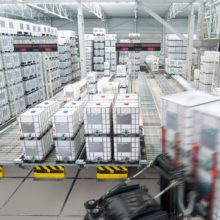
To meet current standards and anticipate future requirements, Suiker Unie has undergone numerous audits. The factories have multiple certifications. In particular, the IFS (German standard for food) and BRC certification (English counterpart) make an important contribution to the company by certifying food safety and quality. The factories have also established a HACCP system (Hazard Analysis Critical Control Points). In 2012, the company was certified according to the FSSC 22000 (food safety system certification) industry standard. The quality assurance is limited to the company’s own processes; the beet farmers and suppliers of bulk goods, technical equipment, packaging materials and services are all included. That is why the sugar producer uses Schütz IBCs.
The global player from the Westerwald started the complex certification process (FSSC 22000 based on ISO 22000 in conjunction with ISO/TS 22002-4) for its worldwide production sites in the same year as it customer. This was the decisive basis for the Foodcert range. These IBCs offer complete safety in three ways: with regard to the materials used, the product and the manufacturing process. They meet the requirements of the Food and Drug Administration (FDA) and European directives and also take into account additional factors to minimise risk. The packaging complies with the much higher requirements for food safety.
Both companies follow the guidelines of the Global Food Safety Initiative (GFSI), which recognizes this system certification. The GFSI is the world’s largest non-profit organization for improving food safety. It was founded in 2000 by food producers and retailers to establish international standards. The influence area of the GFSI and its “Guidance Document” presently includes Europe, the United States, South America, China and India.
Full traceability
Schütz produces Foodcert packaging just-in-time on the basis of individual customer orders: the IBC inner bottles are immediately transferred to final assembly after production and inserted. Each process and each component are uniquely assigned to the relevant packaging, and all steps and components are free from silicone. The identification of the packaging through a barcode system enables seamless traceability right back to batch and process level. On request, Schütz can also assign individual identification numbers for articles or packaging. This is very similar to the internal processes at Suiker Unie: the company uses an automatic Tracking & Tracing system to track raw materials and finished products in every single production step.
Preventive manufacturing
Maximum security requirements require complex preventive programs: just like Suiker Unie, Schütz has implemented numerous measures within the framework of the HACCP concept. These apply to buildings, equipment and the overall production environment. These also include detailed hygiene rules for staff and cleaning plans for the workstations. Additionally, there are measures to prevent foreign objects or dust, regular microbiological examinations of process water and air, protection when dealing with waste, as well as glass and blade management. Maintenance rules and controls for machines, systematic pest control on the entire site, rules for the controlled use of all working substances, especially chemicals, and a secure incoming goods area round off the measures.
Finished Foodcert IBCs are loaded directly indoors without storing and dispatched. Pre-produced components, such as caps, valves and bungs, are also hygienically packaged and stored separately. If the packaging is shipped at a later point then the finished containers and drums are stored in special, closed rooms. Optional plastic covers provide additional protection. All of these measures contribute significantly to preserving of the quality of the filling products.

